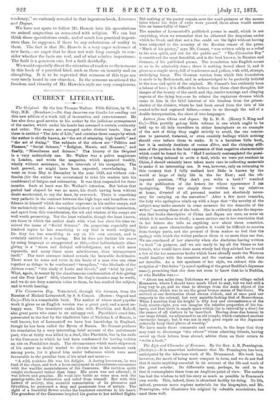The Circassian Boy. Translated, through the German, from the Russian
of Michail Lermontoff, by S S. Conant. (Boston : Osgood and Co.)—This is a remarkable book. The author of whose most popular work it gives us an English version was a great poet, and a most un- happy man. The translator ranks him with Puschkin and Kolzoff, also great poets who came to an unhappy end. Puschkin's cruel fate, persecuted to the last by the vindictive hate of Nicholas L of Russia, is well known, but of Lermontoff we have less knowledge in England, though he has been called the Byron of Russia. Mr. Conant prefaces his translation by a very interesting, brief account of the unfortunate poet, who at thirty was killed in a duel, like Pnschkin, but in the exile to the Caucasus to which he had been condemned for having written an ode on Puschkin's death. The circumstance which made shipwreck of his career no doubt tended to elevate him to his eminent rank among poets, for it placed him under influences which were most favourable to the peculiar turn of his mind and muse:— " A wild, reckless life was his delight. A daring horseman, he was fond of the chase, and took a keen enjoyment in adventurous encounters with the warlike mountaineers of the Caucasus. His reckless spirit sought excitement rather than fame. His scorn was not affected ; it was inborn and genuine. He went into battle as some men seek the gaming-table, for distraction and relief from himself. But with this hatred of society, this scornful renunciation of its pleasures and frivolities, he possessed a deep and passionate love of nature. The sight of a beautiful flower awoke the tenderest emotions in his heart. The grandeur of the Caucasus inspired his genius to her noblest flights.
Did nothing of his poetry remain save the word-pictures of the moun- tains where his days of exile were passed, these alone would assure him an immortality of fame."
The number of Lermontoff's published poems is small, which is not surprising, when we remember that he abhorred the despotism under which he lived, and that not a line could see the light without having been subjected to the scrutiny of the Russian censor of the press. "Much of his poetry," says Mr. Conant, "was written solely as a relief to his own spirit, and not for the public ear." "The Circassian Boy "" is considered the most beautiful, and is the best known, in Russian and German, of his published poems. The translation into English seems to us to be admirably done ; there is nothing forced about it, and it gives us a simple story, full of tenderness and pathos, with wild, strange, underlying fancy. The German version from which this translation is made is by Bodenstadt, and is acknowledged to be perfectly faithful to the tone and spirit of the original. Mr. Conant's has evidently been a labour of love ; it is difficult to believe that these clear thoughts, fair images of the beauty of the earth and sky, tender musings and clinging regrets of the dying boy,—as he relates the rapturous dreams which came to him in the brief interval of his freedom from the prison- shelter of the cloister, where he had been saved from the fate of his routed tribe and captured father,—come to us through the veil of a double interpretation, the sieve of two languages.


































 Previous page
Previous page